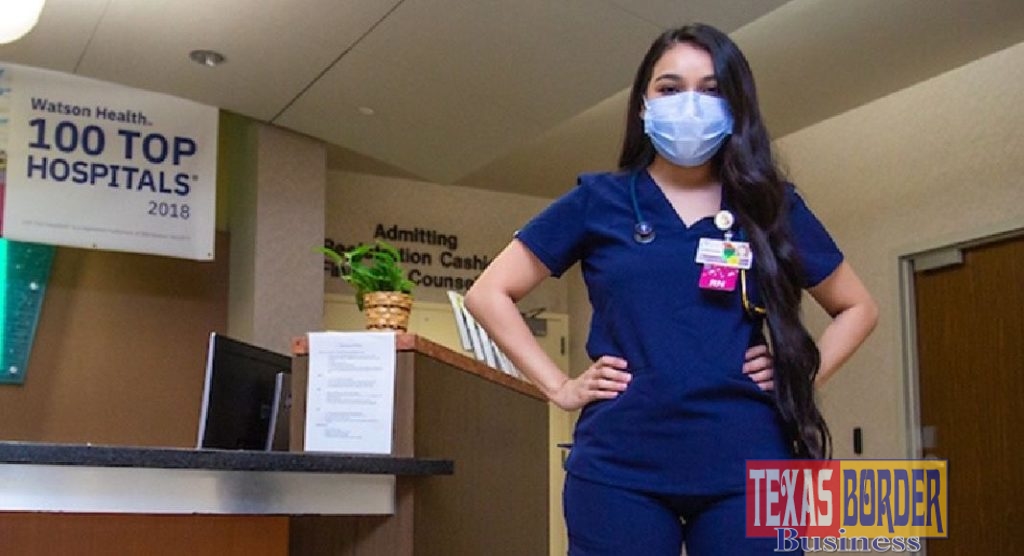STC Associate Degree Nursing program alumna describes what it’s like to be on the frontlines of the COVID-19 pandemic.

Texas Border Business
MCALLEN, TEXAS (May 27, 2020) – Adriana Castro says her inspiration to become a nurse began in her teens. Years later, little did she know that same inspiration would put her on the frontlines of a global pandemic caring for critically sick patients while doing her best to manage her own personal safety.
Castro said she was 16 years old when her oldest sister became sick with an aggressive form of pneumonia and was hospitalized at Rio Grande Regional ICU. It would be the same hospital where she would one day work, she said.
Castro, a 2014 graduate from STC, is now a relief Charge Nurse for the Pediatric Intensive Care unit at Rio Grande Regional Hospital.
With the rapid onset of COVID-19, Castro said it immediately made her concerned for her family’s health. Not only was she caring for her seven-month-old infant, she was also caring for her father-in-law who has Small Cell Lung Carcinoma, an aggressive form of lung cancer.
Since the virus is especially dangerous for those with underlying conditions, Castro said she immediately stocked up on bleach and hand sanitizer. She began limiting her trips to public places, and stopped allowing visitors to her home.
Her work environment also changed significantly when it came to safety. Adriana says all staff at Rio Grande Regional begin their day by washing their hands before entering the facility and getting screened for potential exposure to COVID-19.
According to hospital administrators, everyone entering the hospital will need to wash their hands in one of handwashing stations, have their temperature checked, answer a series of questions and must wear a mask. Implementing these processes will help ensure a safe care environment and protect the health of patients, colleagues and visitors.
Everyone walking through the hospital is required to wear masks, and for her own personal safety Castro said she sanitizes her hands after pressing the buttons from the elevators. She also tries her hardest not to push any doors open with her hands, she said.
Once she is in her unit, she is sure to sanitize her desk area and computer at least 3 times during her shift.
“It’s so hard to try and stay clean because we work with kids 0-18 years of age and sometimes we have to carry them in our arms to do even simple nursing tasks,” Castro said. “We wear clean masks for every room we enter just to be safe, and we have an isolation room designated for children suspected to have the virus. We have ready-to-go kits already in hand to try and limit the times we have to go in the rooms because we have to wear full protective gear each time, and we are trying to save as much personal protective equipment (PPE) as possible.
“Overall we have had a good process in limiting exposure, and we are trying every day to come up with ideas to make nursing tasks easier,” Castro said.
Coming home from work also involves an intricate process, according to Castro. She brings extra clothes to change out of before coming home, along with two pairs of shoes, which she leaves in her car. When she comes home, she enters through the garage and leaves all of her clothes in the washer. She then heads straight to a spare shower that only she uses prior to seeing her family.
“The key is to change gloves often, not touch our face at work and limit the time over all inside a COVID room,” she said. “It has been so hard to live at home with them and I am extremely anxious everyday hoping I don’t bring anything home from work with me.”
The U.S. has had 1.45 million people test positive for COVID-19 as of May 15. Of those, more than 253,000 have recovered while 86,607 have died, according to the Centers for Disease Control and Prevention. Estimates say that more than 1,000 healthcare workers from at least 64 countries around the world have also died combatting the virus, according to Medscape, and online destination for physicians and healthcare professionals worldwide. https://www.medscape.com/viewarticle/927976
In the United States, the CDC said at least 9,282 healthcare professionals contracted the coronavirus in April. For those working in healthcare, they are the most vulnerable during the current pandemic because of their proximity to infected patients, and often times working with a lack of protective equipment.
For better or for worse, Castro says the current pandemic crisis has shown the world just how passionate nurses are about their careers.
“Nursing has to come from your heart,” Castro said. “Even when everyone is at home protecting themselves from this virus, we still go out there every day.
“We love this career,” she said. “This is what we were trained for, and I wouldn’t have it any other way.”















